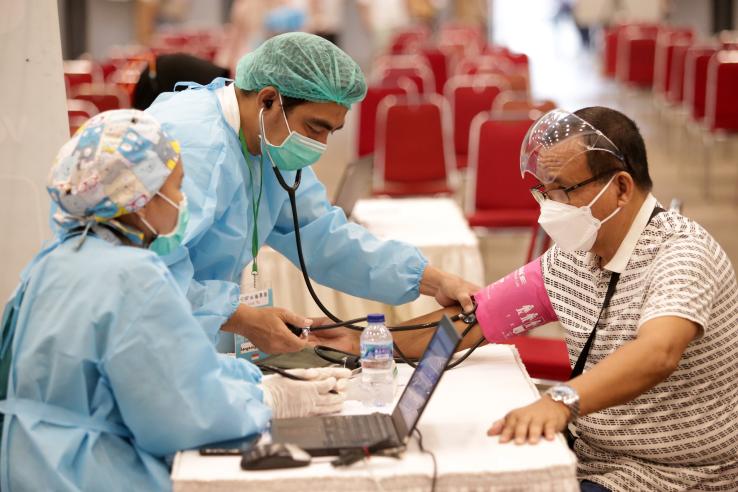J-PAL Southeast Asia at 10: Health

Photo: Toto Santiko Budi | Shutterstock.com
The Impact of a School-Based Smoking Prevention Program in Indonesia: The Indonesian government has implemented a limited set of tobacco control policies despite a high prevalence of cigarette smoking among adolescents. In line with governments’ efforts, former J-PAL affiliated researcher Margaret Triyana (World Bank) and co-author Justin White (UC San Francisco) conducted a randomized evaluation to measure the impact of a school-based program that used a non-monetary penalty and regular monitoring to prevent adolescent tobacco use. Overall, the program reduced the probability that adolescents smoked, with effects sustained three months after the program ended. Incorporating a school competition component into the program had no further impact on smoking abstinence.
Enrolling Informal Sector Workers in the Indonesian National Health Insurance Program: In Indonesia, non-poor informal workers are often less likely to enroll and retain in government health insurance programs, making it challenging to achieve universal health coverage. J-PAL affiliated researchers Abhijit Banerjee (MIT), Amy Finklestein (MIT), Ben Olken (MIT), and Rema Hanna (Harvard) and co-authors Sudarno Sumarto (SMERU Research Institute), and Arianna Ornaghi (Hertie School) conducted a randomized evaluation to test the impact of various programs, including subsidies, registration assistance, and information campaigns on the enrollment and retention of non-poor informal workers in Indonesia’s national health insurance scheme, Jaminan Kesehatan Nasional (JKN). The research finds that registration assistance and subsidies both increased household enrollment, but overall enrollment rates remained low.
Celebrity Twitter endorsement for an immunization public health campaign in Indonesia: J-PAL affiliated researchers Arun Chandrasekhar (Stanford) and Ben Olken (MIT) and co-authors Cindy Paladines (SMERU Research Institute), Markus Mobius (Microsoft Research), and Vivi Alatas (Asakreativita) conducted a randomized evaluation to measure the impact of celebrity Twitter endorsement for a child immunization campaign on the public’s opinion and behavior towards immunization. Findings suggest that celebrity endorsement increased Twitter engagement with the immunization campaign, primarily when celebrities authored messages themselves and did not explicitly cite credible public health sources. Additionally, celebrity endorsement led to increased communication and knowledge about health behaviors in individuals’ communities, though there was no impact on an individuals’ immunization decisions for their children.
An Evaluation of Information Campaigns to Increase the Covid-19 Vaccine: J-PAL invited researcher Armand Sim (Monash University) and co-authors Asad Islam (Monash University), Gita Kusnadi (Center for Indonesia’s Strategic Development Initiative), Jahen Rezki (Universitas Indonesia), Giovanni van Empel (Universitas Gadjah Mada), Michael Vlassopoulos (Southampton University), and Yves Zenou (Monash University) conducted a randomized evaluation to address misinformation and lack-of-information problems about the Covid-19 vaccine and increase the vaccination take-up rate in rural Indonesia. Findings suggest that any form of campaigns may not be effective in promoting vaccination among hesitant individuals, especially when the infectious disease incidence is declining and immunization coverage is high. Additionally, the type of ambassadors (health cadres, nominated influential individuals, or laypersons) that deliver the campaign have no impact on vaccination take-up rate.
The Impact of Home-Based Growth Chart on Child Linear Growth: J-PAL affiliated researcher Gumilang Aryo Sahadewo (Universitas Gadjah Mada) and co-authors Peter Rockers (Boston University), Günther Fink (Swiss TPH and University of Basel), Doug Parkerson (IPA), and Milda Irhamni (Universitas Indonesia) are conducting a study to evaluate the impact and cost-effectiveness of growth charts on child linear growth in Indonesia. Home-based growth charts offer a simple and inexpensive way for caregivers to have access to simple nutrition, health, and sanitation information guided by behavioral economics analysis as well as to track their child's linear growth, empowering them to act to improve their child’s nutrition. The randomized evaluation results are forthcoming.
The Impact of a Large-Scale Community-Led Total Sanitation Program in Indonesia: The prevalent global practice of open defecation leads to preventable fecal-borne diseases such as diarrhea and intestinal worms, which in turn can lead to malnutrition and impaired physical growth. Current and former J-PAL affiliated researchers Lisa Cameron (University of Melbourne) and Manisha Shah (UCLA and their co-authors Abigail Sellman and Rosa Hayes conducted a randomized evaluation to study the impact of a large-scale Community-Led Total Sanitation (CLTS) program in Indonesia on sanitation practices, attitudes towards open defecation, and child health. Overall, CLTS increased toilet construction, reduced roundworm infestations among children under five, and decreased tolerance of open defecation. However, CLTS did not impact other measures of child health and was not effective among poorer households or in communities with lower levels of community participation.*
*Not Implemented by J-PAL SEA (i.e., either implemented independently by researchers, partner organizations, or by Innovations for Poverty Action Philippines).